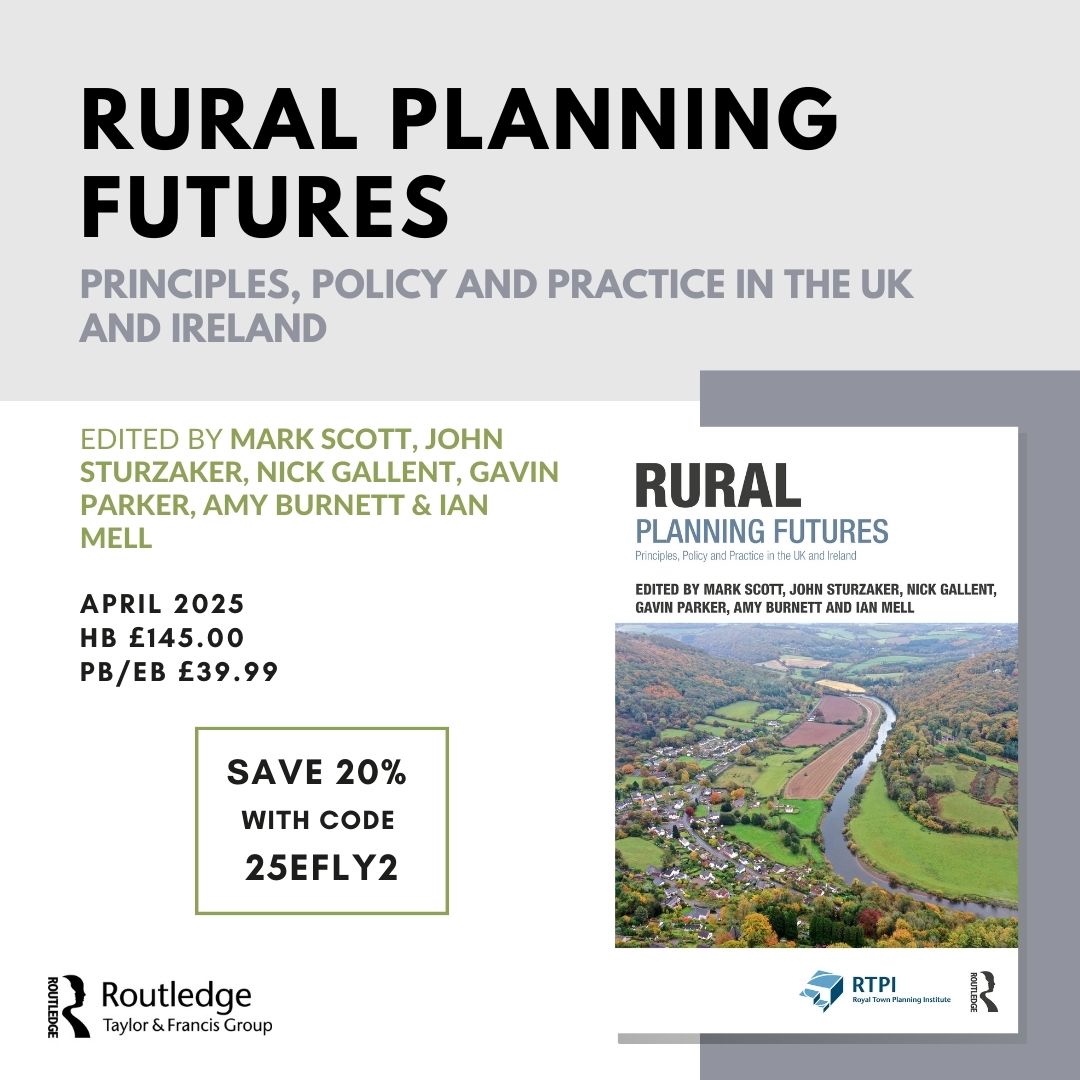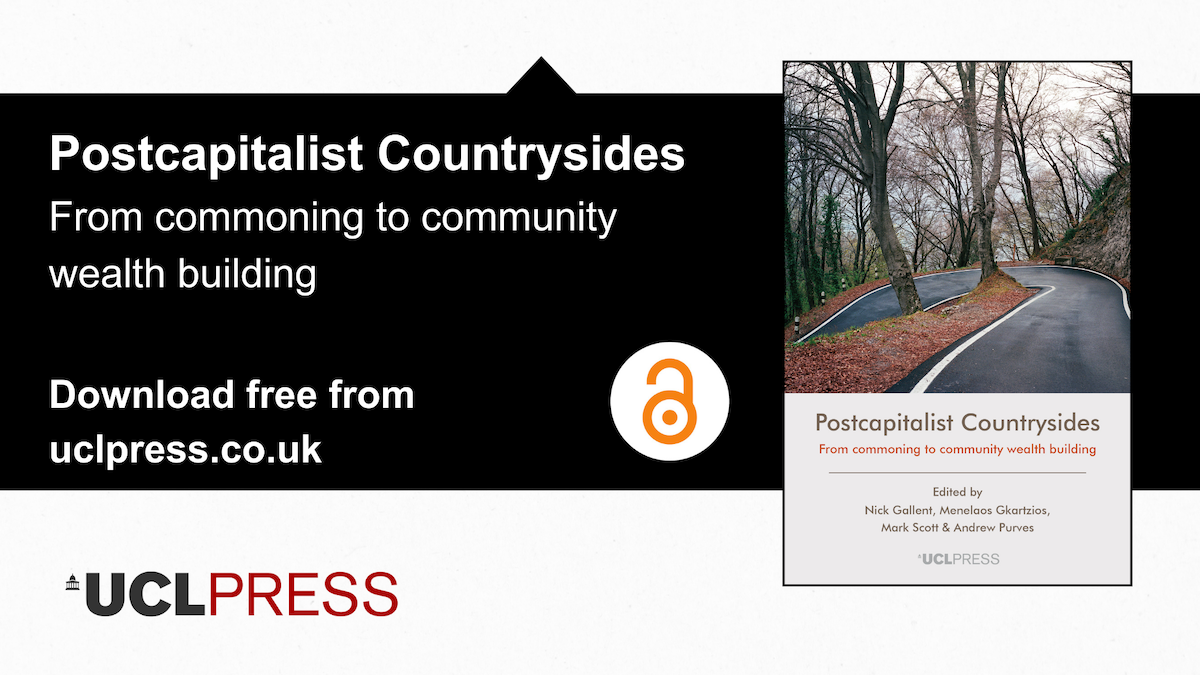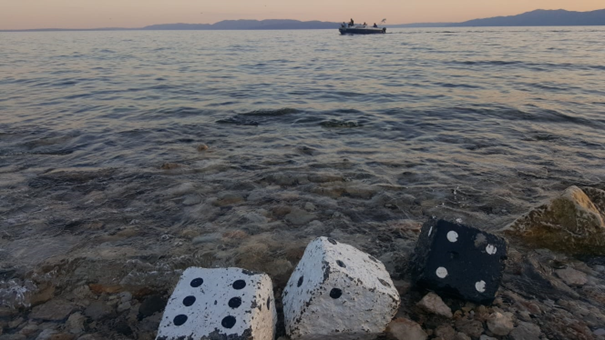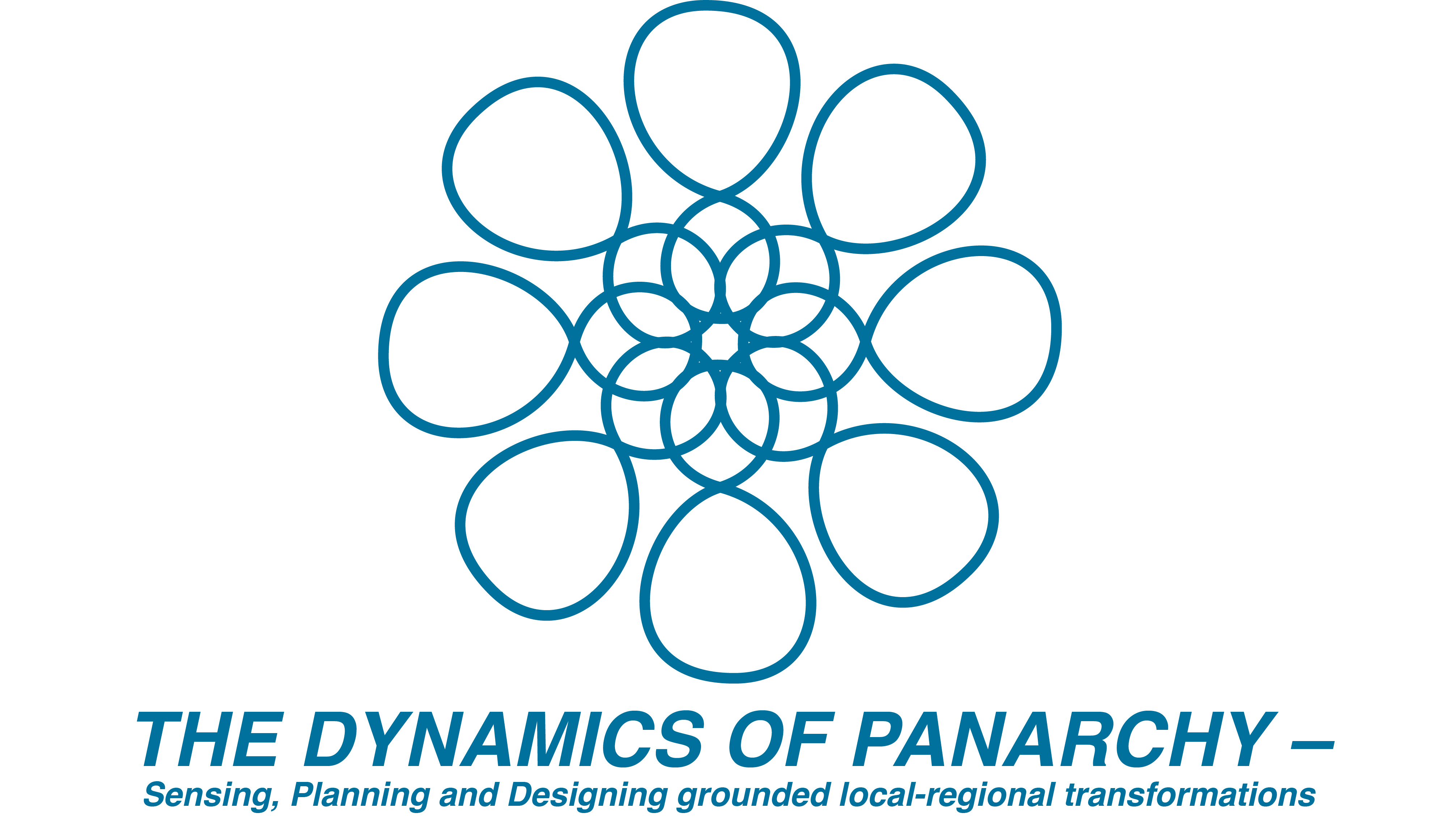THEMATIC GROUPS
- Details
- Parent Category: THEMATIC GROUPS
- Category: Rural Planning
Mark Scott, John Sturzaker, Nick Gallent, Gavin Parker, Amy Burnett and Ian Mell co-edit a new collection published by Routledge (RTPI Series) examining ‘Rural Planning Futures – Principles, Policy and Practice in the UK and Ireland’. The book is available here

- Details
- Parent Category: THEMATIC GROUPS
- Category: Rural Planning
Nick Gallent, Menelaos Gkartzios, Mark Scott and Andrew Purves co-edited a new collection published by UCL Press on “Postcapitalist Countrysides: From commoning to community wealth building”. The book is available open access here: https://uclpress.co.uk/book/postcapitalist-countrysides/

- Details
- Parent Category: THEMATIC GROUPS
- Category: Rural Planning
Professors Menelaos Gkartzios, Mark Scott and Nick Gallent started a new thematic group that focuses on rural planning research and practice. The TG Rural Planning recognises that, in the course of the last century, rural areas have undergone significant transformations and change; they are not simply defined by primary production or dependent on urban areas. Instead they are characterised by economic differentiation, pressures to compete in a globalised economy and often represent critical spaces for planning intervention (addressing planetary challenges such as climate change) and conflict (for example through mediating priorities between economic development, environmental conservation, tourism pressures and housing demand).
The thematic group challenges narratives that portray rural areas as conservative, stagnant, or idyllic. Instead, it explores the emerging, context-specific challenges of rural spatial development and governance, particularly in an era shaped by increased mobility, land use conflict, and political change.
- Details
- Parent Category: THEMATIC GROUPS
- Category: Public Spaces and Urban Cultures
Call for Contributions
Walking with Hope: Public Spaces for Wellbeing
AESOP Thematic Group Public Spaces and Urban Cultures Event
Dates: 16-18 June 2025
Locations: Ljubljana (Slovenia), Rijeka and Cres (Croatia)

For the first event in a series “Urban Cultures, Public Space, and Hope” we invite contributions from a wide range of disciplines including and not limited to architecture, urban planning and design, cultural studies, heritage studies, social sciences, environmental studies, contemporary art, philosophy, community activism and policymaking.
Submit an abstract of not more than 500 words and up to 5 keywords by 28 April 2025 to
Organizers
Urban Planning Institute of the Republic of Slovenia (Ljubljana),
Polygon – Center for Cultural Research and Project Development (Zagreb),
University of Rijeka – DELTALAB – Center for Urban Transition, Architecture and Urbanism (Rijeka),
In collaboration with University of Rijeka, Palace Moise
Theme
We invite you to actively participate in 'Walking with Hope: Public Spaces for Wellbeing,' a unique three-day event exploring the profound connection between our built environments and human wellbeing. We will examine walkability and the role of hope within public spaces through two distinct epistemological perspectives: urban design and artistic expression. This event will explore how the pedestrian experience of public spaces - from streets and squares to parks and community areas - shapes our mood, mental health and sense of community. We aim to foster an interdisciplinary dialogue, bringing together scholars, practitioners, artists, policymakers and community members to envision and create more hopeful, human-centered urban spaces.
The core themes of this event include exploring walkability as a catalyst for social, economic and cultural vitality, understanding the pedestrian's role in politics, urban innovation, art and social change as cultural resistance, and investigating the relationship between urban syntax, architecture and the concept of an error. The event is conceptualised as a combination of lectures, discussions and site visits which will examine urban evolution and adaptation through case studies from Ljubljana, Rijeka and Cres, focusing on balancing preservation of walkable environments with contemporary needs and socio-economic transformation. To differentiate between epistemological approaches in art and urbanism regarding the pedestrian experience and drawing on historical urban pedagogies we will also address human-centered spatial planning and design, focusing on the "errors" in current urban environments and advocating for a renewed focus on human wellbeing, explore the psychological dimensions of spatial experience and aim to understand how urban design and contemporary art can foster positive social interaction and wellbeing.
This event transcends the traditional understanding of walkability, examining it as a critical lens through which we can assess the accessibility, inclusivity and sustainability of our cities and towns. We will investigate how walkability intersects with social equity, environmental justice and the creation of vibrant, community-oriented places, emphasizing the role of art as a tool for critical engagement and transformative intervention. We will address the challenges and opportunities presented by contemporary urban planning, including artistic critical perspectives on emerging urban models. We encourage a discussion that acknowledges both the benefits and potential drawbacks of current trends in urban matters and explores how artistic approaches can illuminate and challenge these trends.
This call is dedicated to the intersection of the two epistemological approaches on how different positions generate knowledge, perception about walking, movement, and public space in relation to the spatial interpretations and transforming experience into identity, atmosphere and consequently the hope.
Preliminary Program
The event will feature keynote speeches by leading experts, paper sessions presenting selected contributions from this call, discussions, case study visits, on-site talks and a hands-on workshop in a small settlement of medieval origin, exploring historical urban pedagogies.
- Monday, 16 June: Ljubljana Session with a focus on Research and Policy Making
- Tuesday, 17 June: Rijeka Session with a focus on Urban Studies and Errors of Hope
- Wednesday, 18 June: Practicum and the case study of the Cres Neighbourhood, focusing on the preservation of vernacular architecture and Renaissance urbanism alongside contemporary citizen-led urban initiatives
Invited Speakers
Sanja Bojanić, University of Rijeka, Academy of Applied Arts
Nikola Bojić, University of Zagreb, Academy of Fine Arts
Branka Cvjetičanin, Polygon, Center for Cultural Research and Project Development
Marin Gregorović, Mayor of City of Cres
Blaž Križnik, University of Ljubljana, Faculty of Arts
Ida Križaj Leko, University of Rijeka, DeltaLab Urban Studies
Luka Mladenovič, Urban Planning Institute of the Republic of Slovenia
Marcell Mars and Miro Šarić
Inge Solis, senior curator, City Museum Cres
Tadej Žaucer, Ministry of the Environment, Climate and Energy of the Republic of Slovenia
Logistics
Participants are responsible for their own accommodation arrangements (15-17 June in Ljubljana, and 17-19 June in Cres).
- Sunday, 15 June: Arrivals to Ljubljana
- Tuesday, 17 June: travel to Rijeka in the morning hours, travel to Cres in the evening hours
- Thursday, 19 June: Return to Ljubljana
Transportation between event locations (from Ljubljana, via Rijeka, to Cres, and back to Ljubljana) will be provided by the organisers, however, seats are limited.
Please note the Ferry-boat location and schedule - Valbiska (island of Krk) to Merag (island of Cres): https://www.jadrolinija.hr/en/travel/valbiska_krk_-_merag_cres
Further information will be provided closer to the event.
Publishing options
A book of abstracts will be published for the event. Furthermore, selected contributors will be invited to prepare full papers for publication in the blind peer-reviewed scientific journal Urbani izziv (Urban Challenge - https://urbani-izziv.uirs.si/en-us/).
How to submit an abstract
An abstract of not more than 500 words and up to 5 keywords should be submitted by 28 April 2025 to
The abstract shall articulate your unique perspective on the “Walking with Hope” event’s central themes, demonstrating a connection between your work and the exploration of walkability’s impact on urban life. This includes specifying how your research or practice addresses walkability as a driver of social, economic and cultural development, and how it considers the pedestrian’s role in shaping urban spaces through politics, planning, art, social change, innovation etc.
Explicitly state the preferred place of your presentation or contribution (Ljubljana, Rijeka or Cres) - to allow for appropriate consideration within the event’s program.
Abstracts will be peer-reviewed, the final decisions of acceptance will be communicated by 5 May 2025.
The contributors are most welcome to join the whole 3-day programme but can also opt for attendance at one or more of the three locations of the event.
Organisational Information
Local organisers:
- Branka Cvjetičanin, Polygon – Center for Cultural Research and Project Development:
This email address is being protected from spambots. You need JavaScript enabled to view it. - Matej Nikšič, Urban Planning Institute of the Republic of Slovenia:
This email address is being protected from spambots. You need JavaScript enabled to view it.
Representatives of AESOP Thematic Group Public Spaces and Urban Cultures:
- Chiara Belingardi, LAPEI University of Florence, Italy
- Mohamed Saleh, University of Groningen, The Netherlands
- Tihomir Viderman, BTU Cottbus – Senftenberg, Germany
Do not hesitate to contact local organisers for more information.
We look forward to your participation in this engaging and thought-provoking event!
More information on AESOP Thematic Group Public Spaces and Urban Cultures series on Hope can be reached here: https://aesop-planning.eu/tg-news/public-spaces-and-urban-cultures/call-for-expressions-of-interest-to-host-the-thematic-groups-meeting-2024-2026-public-spaces-urban-cultures-and-hope

- Details
- Parent Category: THEMATIC GROUPS
- Category: Planning and Complexity

CALL FOR ABSTRACTS
23rd Planning & Complexity Thematic Meeting | 20th year of the AESOP Thematic Group Planning and Complexity
Abstract Submission Deadline (extended): Wednesday, 11 June 2025
[ Download full Call for Papers as PDF ]
THE DYNAMICS OF PANARCHY –
Sensing, Planning and Designing grounded local-regional transformations
27-28 November 2025
Chalmers University of Technology, Gothenburg, Sweden
Planning and design often remain a hierarchical and linear process of planning, implementation and maintenance that meet with increasing political ambitions for inclusion, diversity and the critique of a technocratic agenda to spatial transformations. Initiatives in both practice and research constantly seek to combine both top-down and bottom-up approaches. For example, the recent missions of the European Union to strengthen innovation and development through a combination of overall political leadership and local implementation.
The connection between complexity science and spatial planning has, for at least the last 20 years, put the “the perspective of a world in flow, which feeds dissipative systems, through which these adapt and self-organize more or less continuously” (de Roo, 2018, p.28). However, few researchers and practitioners truly engage with the panarchic dynamic of complex adaptive systems and the theoretical and methodological implications – Non-hierarchical and mutual interaction, self-organization between actors, as well as structures and scales of transformation that follow (Gunderson & Holling, 2002). Furthermore, the transfer of a panarchic and adaptive model, developed for describing ecosystems, to describing social system poses critical questions. Beside adaptation, how do we deal with sustaining a diversity of subsystems? and how do we counteract negative effects such as socio-spatial inequalities and an uneven geographic development?
We invite scholars and scholarly practitioners to contribute with research and initiatives that engage with the dynamics of local-regional spatial transformation and the relations between actors, sectors, levels and scales through the lens of complexity theory, and especially working with panarchy, self-organisation, and the non-hierarchical interaction and dynamics of multi-level planning. How can transformations be more effectively conceptualised theoretically, while being grounded in local-regional realities?
Three avenues are of interest
Designing is in itself an iterative practice between phases of speculation, assessment, and proposing. We are interested in initiatives and studies that engage with design thinking and design practices to move beyond predefined, and often stereotyped visions of sustainable and attractive urban and rural development.
Planning tends to often be seen as a hierarchic and linear process of top-down decisions, regulations and governance. However, it is also a broad repertoire of practices that can create gaps and spaces. We are interested in research that critically engage in how planning can address uneven power relations and seeks radical inclusion and re-configurations that foster diversity and pluralism.
Sensing faces challenges to embark in analyses and interpretation beyond predefined categories and spatial units, e.g. reproducing power relations and spatial configurations. We are interested in approaches that can re-frame our sensing of interdependencies between scales, and that critically analyse the local-regional dynamics of circular systems.
Timeline
- Abstract Submission Deadline: 26 May 2025 extended: Wednesday, 11 June 2025
- Notice of Acceptance: June 2025
- Extended Abstracts Submission & Registration Deadline: 3 October 2025
- Conference in Gothenburg 27-28 November 2025.
Submission details
- Target audience: Early career researchers (e.g. PhD candidates) and seniors (e.g. Professors, Seniors Researchers), practitioners with scholars' interest
- Abstract Length: up to 350 words
- Keywords: Provide 3-5 keywords relevant to your submission
- Contact information: Include your name, affiliation and email.
- References: Provide 3-5 major references relevant to your submission
- Submission: Please e-mail your abstract as a pdf-file to
This email address is being protected from spambots. You need JavaScript enabled to view it.
Keynote speakers
- Jon Norberg: Professor at Department of Ecology, Environment and Plant Sciences, Stockholm University
- Sara Brorström: Professor Department of Business Administration, Gothenburg University
Organisation and Contact
The event is organised by Nils Björling and the research area Local-Regional Transformations at Chalmers University of Technology in Gothenburg, Sweden (local organising team 2025) together with Christian Lamker and Jenni Partanen (thematic group coordinators).
Visit the local organisers at:
https://www.chalmers.se/en/departments/ace/research/local-regional-transformations/
References
- de Roo, G. (2018). Ordering Principles in a Dynamic World of Change – On social complexity, transformation and the conditions for balancing purposeful interventions and spontaneous change. Progress in Planning, 125, 1–32. https://doi.org/10.1016/j.progress.2017.04.002
- Gunderson, L. H., & Holling, C. S. (eds.) (2002). Panarchy: Understanding transformations in human and natural systems. Island Press.


